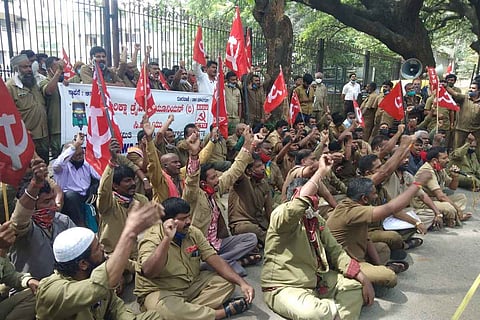

Auto rickshaw drivers in Bengaluru staged a protest in front of the Deputy Commissioner’s office on Tuesday, November 9 demanding a higher fare, just a day after the Karnataka government had revised the fares. On Monday, the state government had released a notification about the revised auto rickshaw fares. According to the notification, the revision would set the minimum fare at Rs 30 for the first 2 km and Rs 15 for every subsequent kilometre.
According to the Auto Rickshaw Drivers’ Union (ARDU), affiliated to the Centre of Indian Trade Unions (CITU), the increase was not adequate. In a letter addressed to the Bengaluru Deputy Commissioner, ARDU demanded that the fare must be a minimum of Rs 30 for the first 1.8 km and at least Rs 16 for every subsequent kilometre.
“Our union welcomes the government notification (that revised the auto rickshaw fares). However, our union has protested and has been submitting request letters from February 2020. Since then, the auto gas (LPG) price has become Rs 66, an increase of around Rs 20. We can't ask for a fare increase for another two years. So, with the skyrocketing prices of everything, this fare is not adequate,” ARDU said in the requisition letter.
Additionally, the notification stated that the first 15 minutes of waiting time will be free and each subsequent 15 minutes will cost Rs 5 for the passenger. Also, the passengers can carry up to 20 kg luggage in the auto rickshaw for free and will have to pay an additional charge of Rs 5 for the next 20 kg of luggage and another Rs 5 for the next 10 kg. The weight of the luggage that can be carried in the auto rickshaw is capped at 50 kg.
Earlier, CN Srinivas, the General Secretary of ARDU had told TNM that the fare revision was necessary as it had been eight years since the last revision and the price of essential commodities had gone up since then.